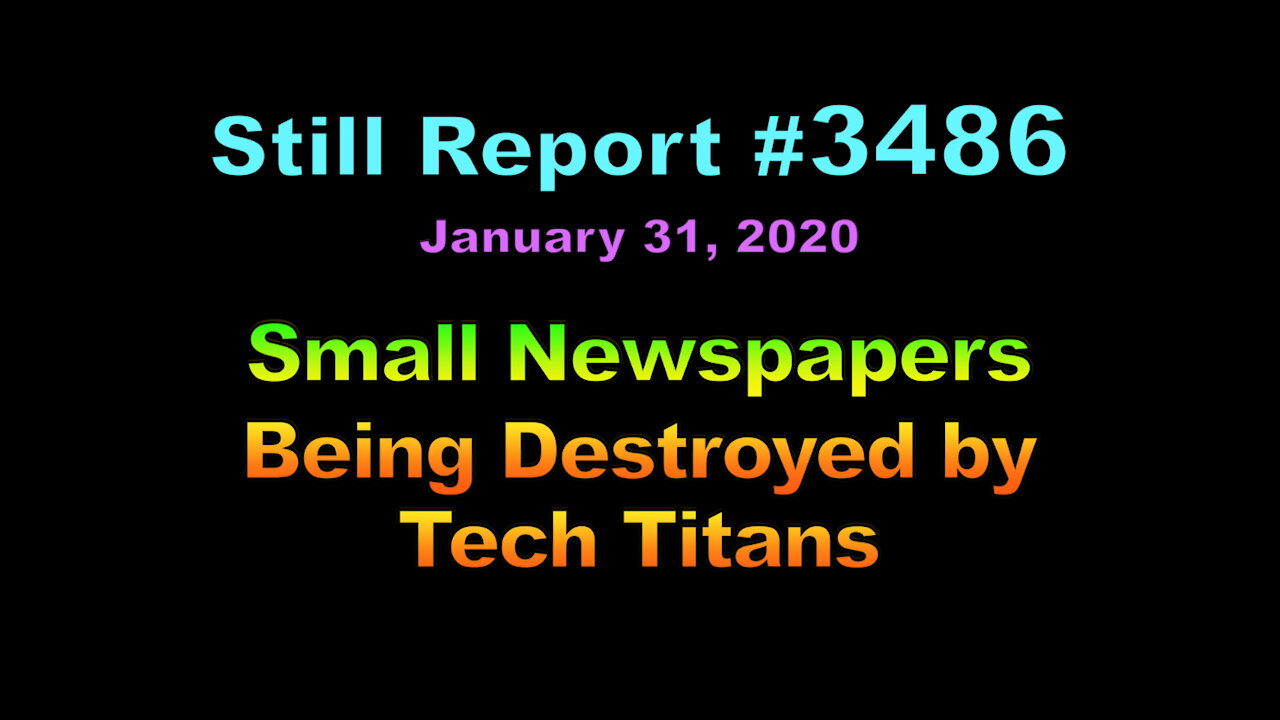Premium Only Content

Small Newspapers Being Destroyed by Big Tech Titans, 3486
Good morning, I’m still reporting on the destruction of small, county newspapers.
I’ve never understood how Google makes so much money, until I read this story in the Epoch Times this morning.
A small, local newspaper group in West Virginia is suing Google and Facebook for anticompetitive business practices.
HD Media Company this week filed a lawsuit in federal court alleging that two tech titans had colluded with each other to violate anti-trust laws by unlawfully exercising their monopoly power over the digital advertising market, which has drastically reduced the primary source of revenue of small county newspapers.
The lawsuit claims that Google and Facebook made a secret, anti-competitive deal between themselves to ensure they had information, speed and other advantages in the advertising placement auctions that Google runs for the mobile phone app advertising business each month in the United States.
The lawsuit further alleges that both companies knew the importance of this agreement being secret because they gave the project a secret code name - “Jedi Blue.”
The details of the alleged agreement were first revealed when 10 state attorneys general sued Google on Dec. 16, 2020 for multiple violations of federal and state antitrust and consumer protection laws.
The lawsuit alleges that the secret agreement came about in 2017 to stop Facebook from supporting a new method of selling online advertising which had successfully circumvented Google’s dominance in ad sales. It was called “header bidding.”
Facebook’s entry into the market WAS effective competition, and advertisers flocked to it and fled from Google’s supremacy whenever they could.
However, that competitive environment did not last long. Instead of competing, which would have reduced the profits of both companies and provided lower-cost advertising to we, the little people, Facebook and Google – allegedly - secretly colluded in the “Jedi blue” deal, suffocating other competition, such as small newspapers, small ad brokers, and small internet news reports, such as the Still Report.
The first few pages of the lawsuit lay out the case in a way anyone can understand.
“Over 20 years ago 2 college students founded a company that forever changed the way that people search the Internet. Since then, Google has expanded its business far beyond search and dropped its famous “don't be evil” motto.
“Its business practices reflect that change. As internal Google documents reveal, Google sought to kill competition and has done so through an array of exclusionary tactics, including an unlawful agreement with Facebook, its largest potential competitive threat, to manipulate advertising auctions.
“The Supreme Court has warned that there are such things as antitrust evils. This litigation will establish that Google is guilty of such antitrust evils, and it seeks to ensure that Google won't be evil anymore.
“Google is an advertising company that makes billions of dollars a year by using individuals’ personal information to engage in targeted digital advertising. Google has extended its reach from search advertising to dominate the online advertising landscape for image based web display ads.
“In its complexity, the market for display ads resembles the most complicated financial markets: publishers and advertisers trade display inventory through brokers and on electronic exchanges at lightning speed.
“As of 2020, Google is a company standing at the apex of power in media and advertising, generating over $161 billion annually with staggering profit margins, almost all of it from advertising.
“Google’s advertising apparatus extends to the new ad exchanges and brokers through which display ads trade. Indeed, nearly all of today’s online publishers (be they large or small) depend on one company—Google—as their middleman to sell their online display ad space in “ad exchanges” ….
“Conversely, nearly every consumer goods company, e-commerce entity, and small business now depend on Google as their respective middleman for purchasing display ads from exchanges in order to market their goods and services to consumers.
“In addition to representing both the buyers and the sellers of online display advertising, Google also operates the largest exchange AdX. In this electronically traded market, Google is pitcher, batter, and umpire, all at the same time.
“The scale of online display advertising markets in the United States is extraordinary…. Whereas financial exchanges such as the NYSE and NASDAQ match millions of trades to thousands of company symbols daily, Google’s exchange processes about [redacted] online ad spaces each day.
“At the same time, Google owns the largest buy-side and sell-side brokers….”
“Google has repeatedly and brazenly violated antitrust and consumer protection laws. Its modus operandi is to monopolize and misrepresent.”
This is the most important part; please pay attention.
“Google uses its powerful position on every side of the online display markets to unlawfully exclude competition. It also boldly claims that “we’ll never sell your personal information to anyone,” but its entire business model is targeted advertising—the purchase and sale of advertisements targeted to individual users based on their personal information.
“From its earliest days, Google’s carefully-curated public reputation of “don’t be evil” has enabled it to act with wide latitude. [In other words, hide their real methods from public view.] That latitude is enhanced by the extreme opacity and complexity of digital advertising markets, which are at least as complex as the most sophisticated financial markets in the world….”
“As the new middleman between publishers and exchanges, Google quickly began to use its new position to exert leverage…. So Google was able to demand that it represent the buy-side, where it extracted one fee, as well as the sell-side, where it extracted a second fee, and it was also able to force transactions to clear in its exchange, where it extracted a third, even larger, fee.”
So that’s how Big Tech makes so much money – and - controlling the advertising money most newspapers, TV stations and networks, and internet news outlets - like the Still Report - absolutely depend upon, it’s not hard to imagine that they will attempt to dominate the political system as well to protect their information dominance.
So, hats off to Texas Attorney General Ken Paxton for leading the charge on this lawsuit. Even if it completely fails in court, it has wildly succeeded in revealing to the public in simple terms why Big Tech has become so rich and powerful.
It’s now up to the courts to finally step in and do something to deconsolidate this power – which is the essential ingredient of the longevity of this freedom-loving Republic.
I'm still reporting from just outside the Citadel of American freedom. Good day.
-
 4:23
4:23
The Still Report
8 days ago4741, Iran's TOPSECRET New Missiles Defeat Israeli Iron Dome, 4741
1.23K1 -
 8:18
8:18
Silverloch Clips
4 years agoAre Big Tech titans backing the Coup plotters?
202K5 -
 0:42
0:42
Dznylvr20
4 years agoSmall dog big stick
22 -
 2:06
2:06
KJRH
4 years agoSmall Town Big Stink
76 -
 1:26
1:26
WGBA
5 years agoDisaster loans are being offered to small businesses
30 -
 0:09
0:09
Kimbeme61
4 years agoBig and small
27 -
 LIVE
LIVE
BEK TV
56 minutes agoTrent Loos in the Morning 6/23/2025
166 watching -
 2:16:18
2:16:18
Side Scrollers Podcast
2 days agoCONTENT NUKE GOES LEGAL, AI To REMAKE Classic Movies, Walter Day Interview | Side Scrollers Live
68.1K15 -
 LIVE
LIVE
Lofi Girl
2 years agolofi hip hop radio 📚 - beats to relax/study to
469 watching -
 49:01
49:01
Anthony Pompliano
2 days ago $7.03 earnedBitcoiners Built Tether Into The Most Profitable Company Ever
41.7K7